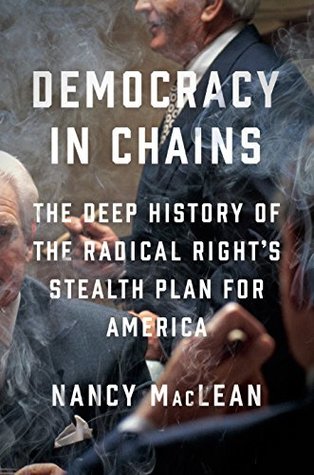More on this book
Community
Kindle Notes & Highlights
Read between
November 10 - November 19, 2024
Libertarians see no legitimate role for government beyond providing for the national defense, ensuring the rule of law (above all, protecting private property), and maintaining social order (to wit: armies, courts, and police).
the single most powerful and least understood threat to democracy today: the attempt by the billionaire-backed radical right to undo democratic governance.
This was Buchanan’s parting gift to the cause he had sired—the insistence that majority rule, under modern conditions, had created such systemic corruption, at such risk to capitalism, that “no existing political constitution contains sufficient constraints or limits” on government.
Their cause, they say, is liberty. But by that they mean the insulation of private property rights from the reach of government—and the takeover of what was long public (schools, prisons, western lands, and much more) by corporations, a system that would radically reduce the freedom of the many.[
Note the emerging pattern, which we will see again: while criticizing government action that threatened his own liberty as a property owner, Calhoun saw nothing untoward in calling on the federal government to use its police powers to help his class stifle debate about its practices. That sleight of hand—denying the legitimacy of government power to act for the common good while using government power to suppress others—appears repeatedly in the pages that follow.
What we are seeing today is a new iteration of that very old impulse in America: the quest of some of the propertied (always, it bears noting, a particularly ideologically extreme—and some would say greedy—subsection of the propertied) to restrict the promise of democracy for the many, acting in the knowledge that the majority would choose other policies if it could.
“The anti-government rhetoric that continues to saturate our political life is rooted in [support for] slavery rather than liberty.”
What exactly did Calhoun so fear coming from “the American people collectively”? He feared, as his successors today do, a government that his band of like-minded property supremacists could not control.
among the white elite in America’s most history-minded region, a refusal to acknowledge the danger of extreme wealth and inequality went hand in hand with antidemocratic and racist strategies of rule.
And then he admitted that he “would go much farther than you [have]. . . . In principle the full burden of education should be borne by the parents of children,” not paid by the state. Why, you may wonder, did Friedman want the government out of schooling? That would promote personal responsibility—through birth control. If parents had to bear the full cost of educating their children, he believed they would have “the appropriate number of children.”[27]
Oliver Hill, one of the NAACP attorneys who filed suit for the student strikers of Prince Edward, stated crisply the principle on which they opposed the grants: “No one in a democratic society has a right to have his private prejudices financed at public expense.”[
Indeed, since the abolitionists had first enlisted the Commerce Clause of the Constitution to try to stop the profitable interstate traffic in human beings, and later when the New Deal had leveraged it to regulate the economy, class and race had been interwoven with property rights and public power in ways that cannot be understood well with a single-factor analysis.[
In fact, the legislators who had voted against the school closure law represented more Virginians than those who voted for it, but the state’s system of apportioning representation made rural votes count for more than urban and suburban votes (rather like the U.S. Senate and the Electoral College overrepresent rural states with small populations).[
“Think how much differently,” the coauthors nudged, faculty and administrators would react to student occupations of their offices if those offices were more like their own homes: if “they should be required to rent, lease, or purchase office facilities from the universities.” Then they might find their spines and stop paying “ransom.”[10] It is hard to read this manifesto and not see the blueprint for the right’s current fight to radically transform public higher education: to turn state universities into dissent-free suppliers of trained labor, run with firm managerial hands and with little
...more
“If you tell a great lie and repeat it often enough, the people will eventually come to believe it,” Joseph Goebbels, a particularly ruthless, yet shrewd, propagandist, is said to have remarked.
Cowen delivered the action implication of its minority following without mincing words: “If American political institutions render market-oriented reforms too difficult to achieve, then perhaps those institutions should be changed.”[
The economist was creating, it seems fair to say, a handbook for how to conduct a fifth-column assault on democracy. “The weakening of the checks and balances” in the American system, Cowen suggested, “would increase the chance of a very good outcome.”
“Democracy,” the towering African American historian John Hope Franklin observed in the midst of World War II, “is essentially an act of faith.”[


